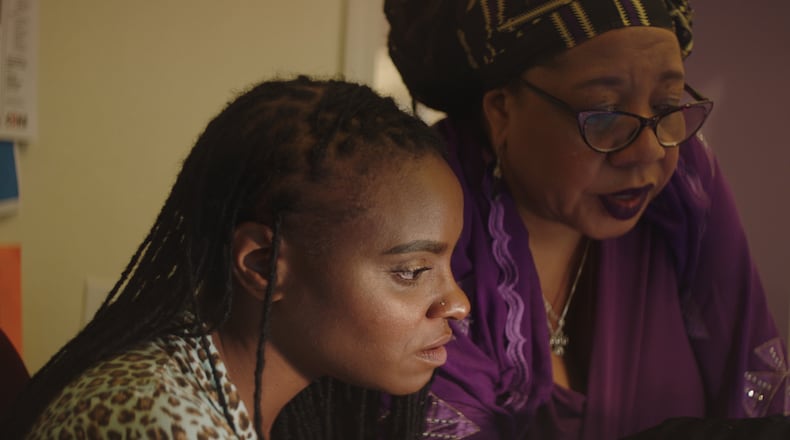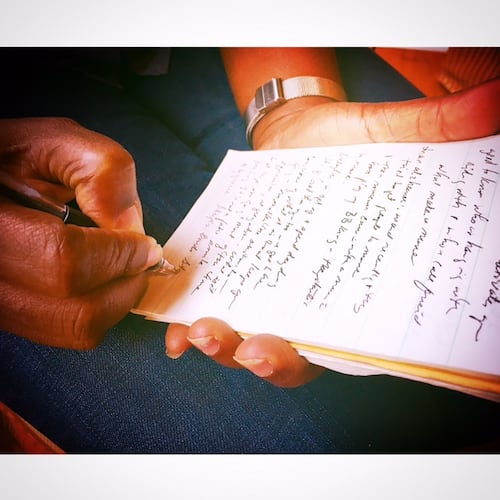A month after leaving the Atlanta Feminist Women’s Health Center in 1989, Dázon Dixon Diallo founded SisterLove Inc., the oldest women-centered HIV and sexual and reproductive justice advocacy organization in the southeastern United States.
Cities, including Atlanta, were overrun with people dying from AIDS-related complications. People were moving to the cities from rural areas because that’s where they could get care.
Even in cities where Ryan White HIV/AIDS Program funds were available, Diallo said a lot of service providers were either not seeing women or weren’t women-friendly.
In 1990, SisterLove, in partnership with Terry McGovern at the HIV Law Project, ACT-UP and other women’s AIDS activists, launched a four-year campaign to expand AIDS guidelines to not only include women, but drug users, homeless people and children.
Sure enough, the cumulative cases of HIV shot up, and most of those were Black women.
“Those were the hardest years of this whole epidemic,” Diallo recalled. “We were realizing AZT (an antiretroviral medication to treat HIV) was not working for enough people and the drug research wasn’t happening fast enough.”
In perhaps the most dramatic discoveries of the AIDS epidemic, the use of AZT during pregnancy cut the risk of mother-to-infant transmission by as much as two-thirds.
The problem, however, was that there were plenty of women who were not pregnant and who were dying.
“The prognosis was 10 weeks to six months, and it was usually six to eight weeks from diagnosis to death,” Diallo said. “For women who were most at risk, they were engaged in the most stigmatizing activities — substance users, sex workers with repeat STIs, or multiple sexual partners, and other behaviors. If you were a woman, Black and poor, then that was just too much to find compassion around. They were getting HIV by sex and that’s how they’d be judged.”
While there were deep stigmas around homosexuality, there were deep stigmas around Black women’s sexuality, period, going back to the days of slavery. Deep stigmas around women engaged with multiple partners, women who were in long-term monogamous relationships, and were in relationships with someone who was doing something they didn’t know about.
On top of all of that, Diallo said there were social safety nets being put into place for people living with AIDS, but the people getting those benefits were men because eligibility was based on AIDS diagnoses, which were based on the government guidelines. Those guidelines were based on treating men with AIDS, not women.
For example, if a woman presented with Kaposi’s sarcoma, a very rare skin cancer especially in healthy young people, she would automatically get an HIV test. If she were dying of cervical cancer, she just died.
“What we learned was that approximately 85% of women diagnosed with AIDS were likely to have some type of cervical dysplasia or cervical cancer which was not included in the list of opportunistic infections within the guidelines,” Diallo said.
By 1996, the first combined therapy drugs hit the scene, making it harder for the virus to replicate itself, and SisterLove found itself in yet another fight: to make sure women all over the world — in Africa, Latin America, South Asia — had access to the same lifesaving drugs men in the U.S. had.
From then to now, she has been fighting for inclusion, not only in treatment and funding but in HIV research.
According to Chris Ridley, a spokesperson for Gilead Sciences, the pharmaceutical company has consistently worked to recruit cisgender women proportionate to the incidence of HIV acquisition among cisgender women in the U.S. in its drug trials. (Cisgender refers to people whose gender identity aligns with the sex they were assigned at birth.)
The company, however, received heavy criticism recently for not only the high cost of its drugs but for testing their efficacy only in men and transgender women.
Between 2005 and 2020, Ridley maintains, the pharmaceutical company helped facilitate more than a half-dozen HIV clinical trials to determine the efficacy of PrEP not only in men who have sex with men but also in transgender and cisgender women. PrEP (pre-exposure prophylaxis) is the breakthrough HIV strategy that, when taken as a daily pill, is more than 90% effective at preventing sexually acquired HIV.
It is scheduled to start another — Descovy for PrEP — by mid-2021 in adolescent girls and women.
To date, he said, cisgender women have been included in five PrEP studies, including Partners PrEP, TDF-2, VOICE, the Bangkok Tenofovir Study, and FemPrEP.
Discussions with community leaders and advocates, including Black Women’s Health Imperative, SisterLove and others, Ridley said, have influenced nearly every aspect of the planned Descovy for PrEP trial — from determining how demographic data will be collected to improving the consent process, to better balancing data collection with participant burden.
“We look forward to continuing dialogue with our community and advocacy partners as we progress in the Descovy for PrEP for Women trial,” he said.
For Diallo, “it’s not too late, but it is too little.”
“It is estimated that for about 270,000 women in the U.S., if they were on PrEP, we could bend the curve on the epidemic,” she said. “But we weren’t included in the original rollout, and again excluded from the latest one.”
And because there’s a dearth of data on the efficacy of PrEP in women relative to men and even fewer data on interventions that could help them more readily use it and stick with it, Diallo said there’s a misconception among many women and their providers about whether women are candidates for PrEP and can effectively take the drug.
“We have reached a juncture when the end of the domestic HIV epidemic is in sight,” she said, “but we cannot move forward if we leave women behind.”
Find Gracie on Facebook (www.facebook.com/graciestaplesajc/) and Twitter (@GStaples_AJC) or email her at gstaples@ajc.com.
About the Author
The Latest
Featured




